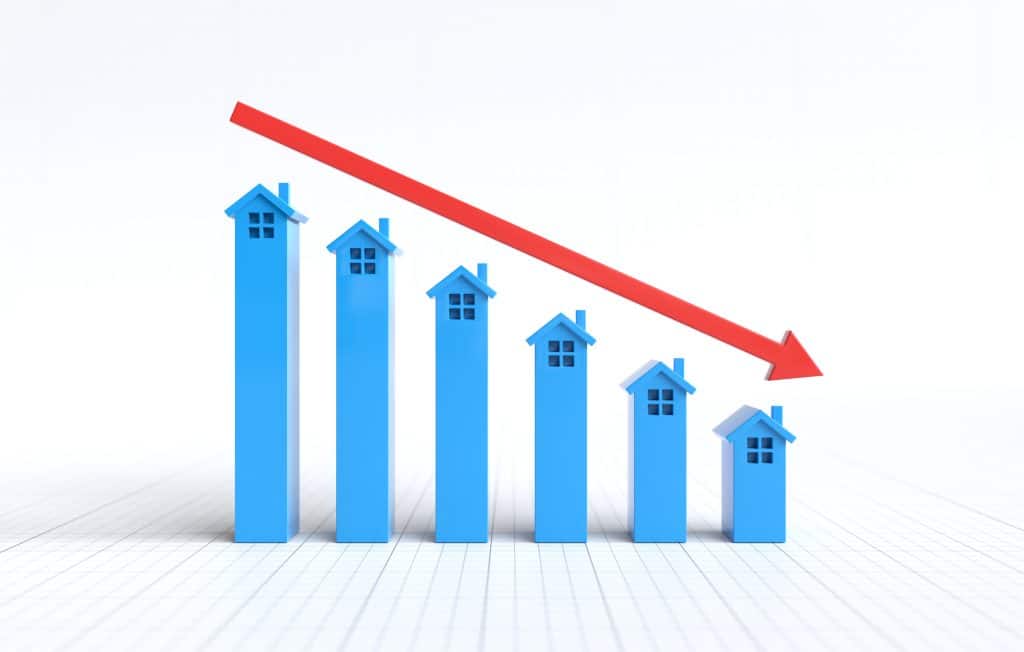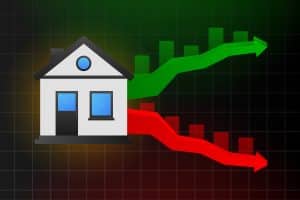Housing market slowdown: insights for buyers and sellers

Anúncios

The Housing market slowdown has become one of the most talked-about economic topics of 2025.
Anúncios
Rising borrowing costs, reduced buyer enthusiasm, and shifts in preferences toward sustainable and flexible living spaces are reshaping the housing landscape.
For buyers, these changes bring both challenges and opportunities, making it essential to understand what’s happening before making a move.
If you are considering entering the market, knowing how these changes affect pricing, financing, and competition can help you make smarter decisions. Let’s break down what this slowdown really means.
Understanding the current housing market slowdown
Truly understanding the current housing market slowdown requires going beyond the surface of fewer sales or slower demand.
Anúncios
Rising mortgage rates, tighter financial conditions, and shifting buyer preferences are reshaping the real estate landscape.
This slowdown is not just a pause in activity but a reflection of broader pressures that affect affordability, homebuilding, and even job markets tied to construction and real estate services.
Key drivers behind the slowdown
One of the central forces driving the Housing market slowdown is the sharp increase in interest rates. Higher borrowing costs make monthly payments less affordable and discourage new buyers.
At the same time, economic uncertainty surrounding wages and job stability has pushed households to delay major decisions like home purchases.
Supply and demand imbalances also play a role, as some regions have seen inventory build up while demand cools. Policy changes in lending practices and taxation further influence how buyers and sellers act.
Regional differences in the slowdown
The Housing market slowdown is not uniform across the country.
Some areas with strong employment growth continue to see steady demand and stable prices, while regions with heavy construction activity are experiencing sharper corrections as supply exceeds demand.
These differences show why it is essential to focus on local market conditions rather than relying only on national averages. Buyers and sellers must analyze their specific regions to understand how these changes truly impact them.
Adapting to changing market realities
For buyers, the Housing market slowdown brings both obstacles and openings. While higher mortgage rates challenge affordability, reduced competition often means fewer bidding wars and greater negotiating power.
Buyers now have more time to study listings, compare financing options, and work with agents to secure better terms.
Sellers, on the other hand, need to adjust expectations, sometimes offering incentives or being more flexible with pricing to attract interest.
In essence, understanding the current Housing market slowdown means recognizing that the market is recalibrating.
It is not a collapse but a realignment where patience, research, and strategic decisions can make the difference between missed opportunities and successful outcomes.
Factors contributing to the housing market slowdown
Several interconnected elements are behind the Housing market slowdown, and understanding these drivers is crucial for both buyers and sellers.
Rising mortgage rates, shifting demand, and broader economic pressures are reshaping the landscape in ways that affect affordability and confidence.
Rising interest rates and affordability
One of the strongest contributors to the Housing market slowdown is the increase in interest rates. Higher borrowing costs directly impact monthly mortgage payments, making it harder for many households to qualify for loans.
This has led to a drop in mortgage applications and caused many potential buyers to step back from the market. As a result, affordability has become a major barrier, especially for first-time buyers.
Economic uncertainty and consumer caution
Economic uncertainty has also slowed momentum. With job growth showing signs of weakness and inflation reducing household budgets, many families are hesitant to take on new financial commitments.
This cautious approach delays buying decisions and reinforces the effects of the slowdown. Reports show that buyers are not only concerned about present conditions but also about the long-term stability of the economy.
Supply and demand imbalances
The balance between supply and demand has shifted in many regions. An increase in housing inventory combined with a slowdown in buyer interest means properties remain longer on the market.
While this creates opportunities for negotiations, it also pressures sellers to lower prices or offer incentives.
In some areas, builders are holding back on new projects due to concerns about oversupply, adding another layer to the Housing market slowdown.
The role of policy changes
Government policies and regulations continue to influence the pace of the market. Lending requirements, property tax adjustments, and zoning regulations can either support or restrict buyer activity.
During times of fragility, even small changes in policy can create ripple effects that impact demand.
Overall, the Housing market slowdown is the result of a combination of financial, economic, and policy factors. Buyers and sellers who understand these drivers can better anticipate shifts in the market and adapt their strategies accordingly.
Impact of the housing market slowdown on buyers

The Housing market slowdown has created a new environment for buyers, filled with both opportunities and challenges.
While affordability remains a pressing concern due to higher borrowing costs, the cooling market also reduces competition and gives buyers more leverage during negotiations.
Reduced competition and stronger negotiating power
One of the most noticeable effects of the Housing market slowdown is the drop in buyer competition. Unlike in recent years, when bidding wars were common, buyers today face less pressure to rush into offers.
This shift allows them to explore more properties, negotiate prices, and request favorable terms such as repairs or seller concessions. For many, this change has transformed a stressful process into a more measured one.
Affordability challenges with rising rates
Despite improved negotiating conditions, affordability remains a key hurdle. Rising interest rates have increased monthly mortgage payments, meaning that even if prices stabilize or decline, the overall cost of buying a home can still feel out of reach.
Reports show that many buyers, particularly first-time homeowners, are being priced out, which reflects one of the deepest consequences of the slowdown.
More time for research and decision-making
The Housing market slowdown also gives buyers more time to evaluate their options. Instead of making rushed decisions, they can conduct thorough research on neighborhoods, property values, and financing opportunities.
This slower pace encourages smarter choices and long-term planning, especially for families looking to settle in stable communities.
In short, the Housing market slowdown is reshaping the buying experience. It offers breathing room and negotiating power, but it also places greater importance on financial readiness and careful planning to overcome the affordability gap.
Buyers who balance patience with preparation will be best positioned to take advantage of this shifting market.
Tips for navigating a slowing housing market
For buyers, navigating a Housing market slowdown requires patience, preparation, and a clear understanding of how changing conditions affect opportunities.
While affordability challenges remain, the cooling pace of sales can work in favor of those who know how to adapt their strategies.
Research and track market trends
The first step in navigating a Housing market slowdown is staying informed. Buyers should monitor property values, the number of days homes spend on the market, and any patterns of price reductions.
Tracking these indicators helps identify areas where negotiating opportunities are strongest and where long-term investments may hold value. Working with a local agent who understands these nuances can provide a critical advantage.
Strengthen negotiation strategies
A slower market means sellers are more open to discussions, giving buyers leverage to request lower prices, closing cost assistance, or property improvements.
Establishing a clear budget, highlighting strengths such as being pre-approved for a mortgage, and maintaining flexibility on terms can all result in better deals.
The Housing market slowdown puts buyers in a stronger position to shape outcomes that suit their needs.
Be patient but financially prepared
Patience is one of the greatest advantages during a Housing market slowdown, but it must be paired with readiness.
Buyers should use this time to improve their financial profile by saving for larger down payments, boosting credit scores, or exploring mortgage options.
Being prepared to act when the right property appears allows buyers to take advantage of reduced competition without missing valuable opportunities.
In practice, navigating the Housing market slowdown is about balance: combining careful research with decisive action when conditions align.
Buyers who approach the market with strategy and discipline will be better positioned to secure long-term value in a shifting real estate landscape.
Long-term effects of the housing market slowdown
The Housing market slowdown is not just a temporary cooling but a shift that can create long-lasting impacts on property values, buyer behavior, and the broader real estate industry.
Understanding these effects is critical for both homeowners and potential buyers who are planning for the future.
Property values and investment stability
One of the most significant long-term effects of the Housing market slowdown is its influence on property values. Prolonged weak demand can cause home prices to stabilize or even decline in certain regions.
For current homeowners, this may create concerns about equity and the value of their investments. For buyers, however, it may present opportunities to purchase properties at more affordable prices.
Market corrections are part of natural real estate cycles, but recovery can take years depending on local economic conditions.
Changing buyer behavior and expectations
As the Housing market slowdown continues, buyers tend to become more cautious and selective.
They invest more time in research, request more concessions from sellers, and place higher importance on features like energy efficiency, home offices, and outdoor spaces.
This shift forces sellers to adapt, improving listings and offering incentives to remain competitive. Over time, this change in expectations reshapes the way homes are marketed and valued.
Effects on real estate professionals and jobs
The slowdown also affects hiring and job trends in real estate and construction. With fewer transactions and new projects, real estate agents, mortgage brokers, and builders face greater competition for business.
Reports already point to concerns about job reductions in homebuilding, a sector closely tied to the health of the housing market.
Professionals who adapt by diversifying their services, offering tailored financing solutions, or focusing on niche markets will be best positioned to thrive during prolonged slowdowns.
In the long run, the Housing market slowdown will reshape not only how homes are bought and sold but also how the real estate industry operates.
Buyers, sellers, and professionals alike must prepare for a market that demands more adaptability, patience, and strategic planning.
Future predictions for the housing market

Looking ahead, the trajectory of the Housing market slowdown will depend on how interest rates, economic growth, and buyer sentiment evolve.
While short-term conditions remain challenging, analysts point to several trends that could define the market over the next few years.
Price stabilization rather than collapse
Experts suggest that the Housing market slowdown is unlikely to result in a dramatic crash. Instead, prices are expected to stabilize, particularly in areas with strong employment and limited housing supply.
Certain regions may even experience modest gains as local demand balances national weakness. However, in areas with oversupply, property values could continue to soften, creating opportunities for buyers but challenges for sellers.
Shifts in buyer priorities
Another trend expected to shape the future is the transformation of buyer preferences. Remote work, which continues to influence housing choices, has pushed demand for home offices, larger living spaces, and properties with outdoor amenities.
Eco-friendly features such as energy-efficient appliances and sustainable designs are also becoming priorities. The Housing market slowdown has made buyers more selective, and this shift will continue to drive how sellers position their homes.
The role of technology and innovation
Technology is poised to become an even greater force in real estate. Virtual tours, online financing platforms, and data-driven valuation tools are making transactions faster and more transparent.
Smart home technology is also gaining traction as a selling point. As the Housing market slowdown encourages buyers to take more time researching options, digital tools will play a central role in decision-making and property marketing.
In summary, the future of the housing market will likely be characterized by stabilization, shifting buyer demands, and deeper reliance on technology.
While uncertainty remains, the slowdown provides an opportunity for the market to recalibrate and adjust to new economic realities. Buyers who stay informed and adaptable will be in the best position to benefit from these evolving trends.
Conclusion
The Housing market slowdown is more than just a seasonal adjustment, it represents a turning point for the real estate sector and the wider economy.
With rising interest rates making mortgages less affordable, many buyers are stepping back, which in turn is reshaping property values and seller expectations.
This cooling period has created uncertainty but also new possibilities for those willing to act strategically.
Recent analysis from Fortune highlights that Federal Reserve officials are paying closer attention to the housing sector, warning that sustained weakness could ripple into homebuilding activity and related job markets.
Meanwhile, Yahoo Finance notes that policymakers are increasingly worried about how fragility in housing could slow overall economic growth, showing that the slowdown extends beyond real estate and into broader financial stability.
For buyers, this environment is both a challenge and an opportunity. The Housing market slowdown reduces competition and creates negotiating power, but it also demands careful planning as affordability remains strained.
By staying informed, leveraging expert advice, and focusing on long-term needs, buyers can navigate this period successfully.
Ultimately, the slowdown is not just about falling demand, it is about recalibration.
The market is adjusting to new economic realities, and those who prepare thoughtfully can turn fragility into a chance to secure value, stability, and opportunity in their housing journey.
FAQ – Frequently Asked Questions about the Housing Market Slowdown
What is causing the current housing market slowdown?
The slowdown is primarily due to rising interest rates, economic uncertainty, and an increase in housing supply without corresponding demand.
How does the housing market slowdown affect home prices?
During a slowdown, home prices may stabilize or decrease, leading to a more favorable environment for buyers but potentially challenging for sellers.
What trends should buyers look for in a slowing market?
Buyers should pay attention to features like energy efficiency, home office spaces, and outdoor areas, as these may become more desirable.
How can technology influence home buying in the future?
Technology can streamline the buying process through virtual tours, online transactions, and smart home features, making it easier for buyers to find and purchase homes.
Liked the article?






